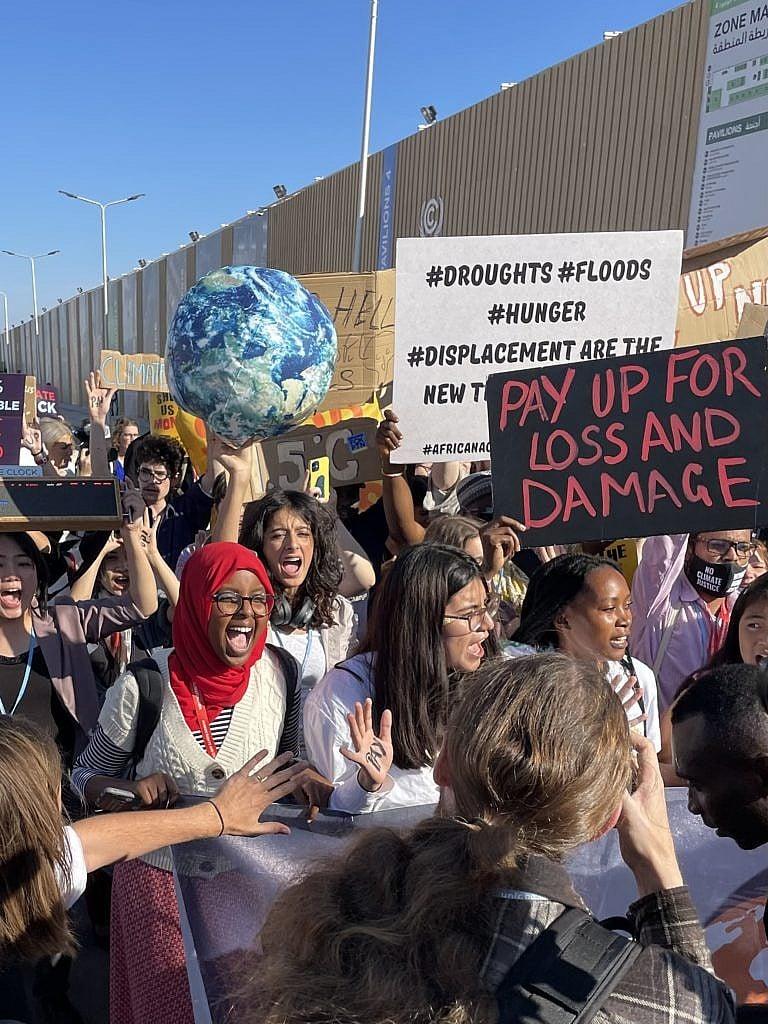Why I’m suing the Ontario government over its climate change inaction
I saw the effects of climate change firsthand at home in northern Ontario. Now, at 15, I’m suing the government for not doing enough to stop it.

“As I became more involved in climate activism, I started going to rallies. I was struck by Greta Thunberg, who said, ‘Why should we study for a future that is being taken away from us?'” (Photos courtesy the Mathur family)
Share
My family always talked about climate change at the dinner table. My mom worked as a lobbyist for the Citizens’ Climate Lobby, and when I was around seven years old, I asked if I could tag along with her around Parliament. Watching her advocate for progress, I realized that climate change wasn’t just a dinner table discussion. It wasn’t just my mom’s job. It was a real issue that is affecting me, and I saw that if we work together, we can protect our future.
In northern Ontario, I live near a forest. When I was younger, I used to be able to go out and pick blueberries every summer. That’s rare now, because climate change shortened our blueberry season significantly. The changing weather also affected my family a couple of years ago during the winter. With unusual fluctuations in winter temperatures, multiple layers of ice and snow built up on our roof. The weight of this build-up was so heavy, hired contractors couldn’t even shovel it off. Our roof was at risk of collapsing, and the city of Sudbury gave my family one hour to evacuate our house. Our insurance company set us up at the Homewood Suites that night, where we stayed for six months. But a hotel can never feel like home. I was grateful we had somewhere to stay, but I missed the forest by my house, my friends in the neighbourhood, our home-cooked meals and dinner table discussions.

We found out that our roof beams had snapped under the weight of the snow and ice. Eventually, the roof would have completely caved into our bedrooms, and the walls of our house would have collapsed outwards. During the reconstruction process, the roof was installed by a crane, and everything on the second floor had to be redone, including the floor, the bathrooms and the stairs. It was haunting to visit my home and see a “condemned” sticker on the door. But, I also know that there are so many people around the world who feel even stronger effects of climate change.
As I became more involved in climate activism, I started going to rallies. My first memory of one was the 2014 People’s Climate March in New York, when I was seven years old. I’ve gone to more since; in 2018, I was struck by Greta Thunberg, who said, “Why should we study for a future that is being taken away from us?” I started striking on Fridays and amplifying my message that we need to listen to the experts on climate change. I don’t do weekly strikes anymore, but I help plan bigger events with politicians in our city to show that there are young people in Canada concerned about climate change. Recently, I also attended the COP27 meeting with my mom and dad in Egypt. I met my mom’s colleagues from Africa, who told me that they have seen starvation caused by climate change. It felt important to spend time with a huge community that is focused on protecting our future.

In Ontario, we started to make advancements with the previous Wynne government. We put policies in place like the provincial cap-and-trade program that helped reduce greenhouse gas emissions. We want the current Ontario government to reach the 2030 goal of decreasing emissions 45 per cent below 2005 levels, but Premier Doug Ford’s government isn’t following Canada’s target on carbon pricing, nor is it working to meet the Paris Agreement goal. Ford decided to shut down the cap-and-trade program and add a plastic pickup day, which won’t get us to where we need to be.
In November of 2018, the non-profit Ecojustice asked me to participate in a lawsuit against the Ontario government. They saw my Twitter account, and they wanted local activists to join their cause. It was an immediate honour. I met the other six young people who were part of the case, who are all from different places in Ontario and share concerns that our government isn’t doing enough. One of them is Alex Neufeldt, who runs a small dress rental business. She lives in Ottawa, where there was bad flooding in 2019, and she noticed that her business wasn’t doing as well after that. She said that the bad weather caused by climate change has economic impacts—people are less likely to go out and support small businesses when they’re worried about their lives.
In the lawsuit, we use the Canadian Charter of Rights and Freedoms to argue that the Ford government is not protecting our fundamental human rights because it took away the previous climate policies of the Wynne government, and it isn’t following up to meet Canada’s emissions target. Our provincial government’s inaction will not protect future generations. This lawsuit can help set a precedent, and it’s the first case in the Canadian system to reach a full hearing about how climate change may threaten our Charter-protected rights.
A day before our court hearing in September of 2022, we held a press conference. I talked about how I was the first kid in Canada to launch a school strike for the climate, and I joined this case because I felt like I could make a real impact on the climate crisis. I had seen with my own eyes the dangers of extreme weather, with rapid freezing and thawing cycles in my city, and I told the press that we had to hold politicians accountable. No matter what happens in this case, the public will be watching, and they will realize that the Ontario government is actively contributing to emissions and putting our future at risk. After our online hearing, we’re still waiting for a decision, which could take months or maybe even a year.
This case has affected my life in some ways. I occasionally missed school to go to a lawsuit meeting and fell behind on homework, but my teachers are very supportive of what I do. However, I’ve also received a lot more backlash on social media given this case’s public and political stance, which I’m not used to. I used to read hate comments or articles about myself. Once, after I replied to a negative comment on my post about meeting with a politician, my Twitter account was hacked the next day, and I had to restart my entire platform. My mom eventually noticed the negative effect this was having on me, and she began to monitor and delete hate comments.
I’m hopeful that we’ll win this case. Even if we lose, we’re still pushing the ball further for the future. But I don’t want to do this level of activism forever—I’m just a kid. I think a lot of people think I’m doing this because the environment is a huge passion of mine. That’s not true—it’s a concern of mine. I don’t want to spend the next 50 years of my life talking about climate change, because we don’t have that much time left to act.
— As told to Russul Sahib